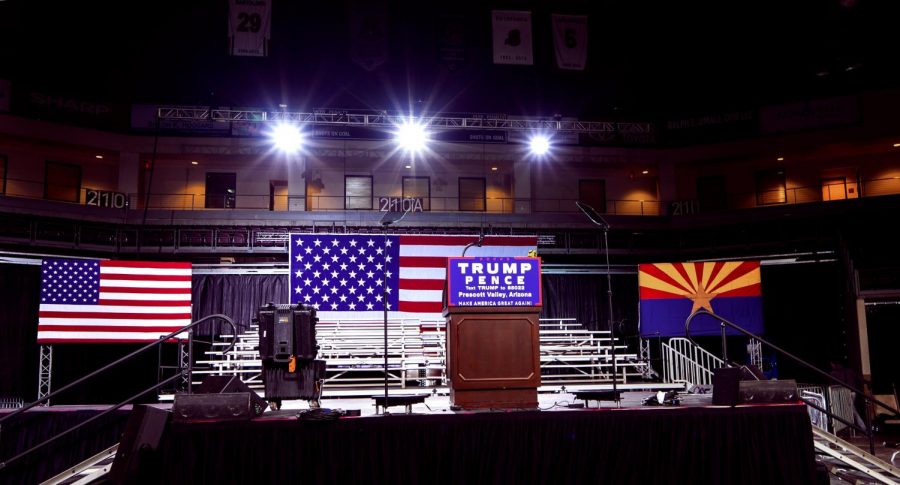Opinion | Donald Trump manifests America’s democratic decadence
This is the first Trump-Pence Rally in Arizona, held on October 4, 2016. Columnist Nathaniel reminds America that democracy takes work.
Oct 29, 2020
American democracy is in a marathon: America is not necessarily at the start, but the finish is still miles ahead.
This nation’s inner demons and residual sins have plagued it even before the signing of the declaration, and although progress has been noticeable, America still has a long voyage ahead of her before embodying the words enshrined in her Constitution.
With the “Trump Show” almost certainly heading for a curtain call as America arrives at its anticipated election, America must realize its problems — only exacerbated by President Donald Trump — will not dissipate overnight with the transition to a new administration.
Democracies take work, and America is no exception to this reality. One gives Trump too much credit when claiming he is a force declaring “war on democracy.” It is evident his policies and rhetoric lean more on the chaotic side, but Trump is far more the culmination of a democratic decay rather than its one and only pillager.
Pre-democratic decadence, America could stand on its accomplishments and lead the world toward further prosperity and avoid smoggy domestic disturbances and malarkey. Now take those truths, mix in a former reality TV show host, notable narcissist and an individual privy to failure, and voila, America today only succeeds at failing.
Get The Daily Illini in your inbox!
Post-decadence, America has been bent to its absolute limits. America in the modern age has decayed its once illustrious facade: including a never-ending War on Terror spurred on by falsehoods, a hyper-partisan Congress that fails in cooperating and even a president having sexual relations with a White House intern.
With the current lack of checks and balances, Trump will not be a one-time phenomenon. As history has shown, candidates akin to Trump’s embodiment of divisive identity politics have existed far before Trump — Sen. Barry Goldwater in 1964 being the epitome — and Trump has proven a democratically malicious presidency is not inherently disqualifying.
In addition, danger looms over the horizon with the 2024 election starting momentarily with — dependent on a Trump loss — some precarious republicans already vying for the Trump-torch, such as senators Tom Cotton and Josh Hawley.
Nonetheless, American democracy’s light has ever-so-slightly dimmed in turbulent modern times; to repair American democracy, guardrails must be built and maintained to limit federal complacency.
America cannot just hope a president will be presidential. A crucial conclusion of Trump has shown previous norms warrant no protection against tyranny and abuse of power. Going forward, democratic safeguards must be instituted to prevent a more dangerous president: one with Trump’s rhetoric, but an actual comprehension of the office.
One area that pertains to restoring checks and balances is the overhaul of congressional subpoenas. According to Forensic News, the Trump administration stonewalled a whopping 82 House subpoenas as of October 2019, a number that certainly has only increased.
Former Rep.Brad Miller in “Preventing the Next Trump” appeals that Congress must pass legislation to enforce and prioritize its power of subpoenas. As the Constitution chronicles Congress’ oversight power directly in Article I, Section 1, Miller adds, “Congress should enact legislation to expedite lawsuits to enforce congressional subpoenas.”
Besides prioritizing expediting, Miller also suggests enacting legislation that better enforces and addresses fines for stonewalling subpoenas not only allows Congress to proactively flow through its oversight in protecting democracy, but also limits another potential Trump-like figure who will stonewall subpoenas and refuse to answer for their possible misdeeds.
Another way in which America’s ship can be steadied is through addressing the rise in “Big Money” — especially that going toward Congress. Through financing campaigns and politicians, D.C. has shifted its focus away from Main Street and looked toward Wall Street as its most meaningful constituents.
According to the nonpartisan Center for Responsive Politics, the 2020 campaign season is approaching a record spending of $11 billion. This volume of money in politics is not only concerning in how it persuades candidates’ policies, but also in it lacking any sign of stopping.
Rep. Justin Amash is no stranger to the dysfunction of America’s decadent democracy.
In his Washington Post op-ed outlining his departure from Trump’s GOP, Amash said, “In this hyperpartisan environment, congressional leaders use every tool to compel party members to stick with the team, dangling chairmanships, committee assignments, bill sponsorships, endorsements and campaign resources.”
Similarly, Amash connects this leadership manipulation to campaign finance when discussing the influence of money mudding the performance of Washington.
“As donors recognize the growing power of party leaders, they supply these officials with ever-increasing funds, which, in turn, further tightens their grip on power,” he said.
Luckily, the times are changing, and with that comes the stifling of “Big Money.” Whether it be for genuine concern or pretend, today several representatives now speak out against the influence of “Big Money” and swear it off — notably Rep. Alexandria Ocasio-Cortez and Rep. Matt Gaetz.
Addressing congressional oversight and campaign finance represent only the foundation in reconstructing a deeply fractured wall. Nevertheless, it is always valuable to acknowledge change takes time, and just as one president cannot wreck an entire bureaucracy in one go-around, no single president can patch its incessant holes in one term.
The damaging rhetoric and harmful policies of Trump illuminate the reality that corruption and ineptitude are undoubtedly prevalent in today’s decadent democracy, and now the maintenance in recovering this union must be established before the American experiment fails.
Nathaniel is a sophomore in LAS.






